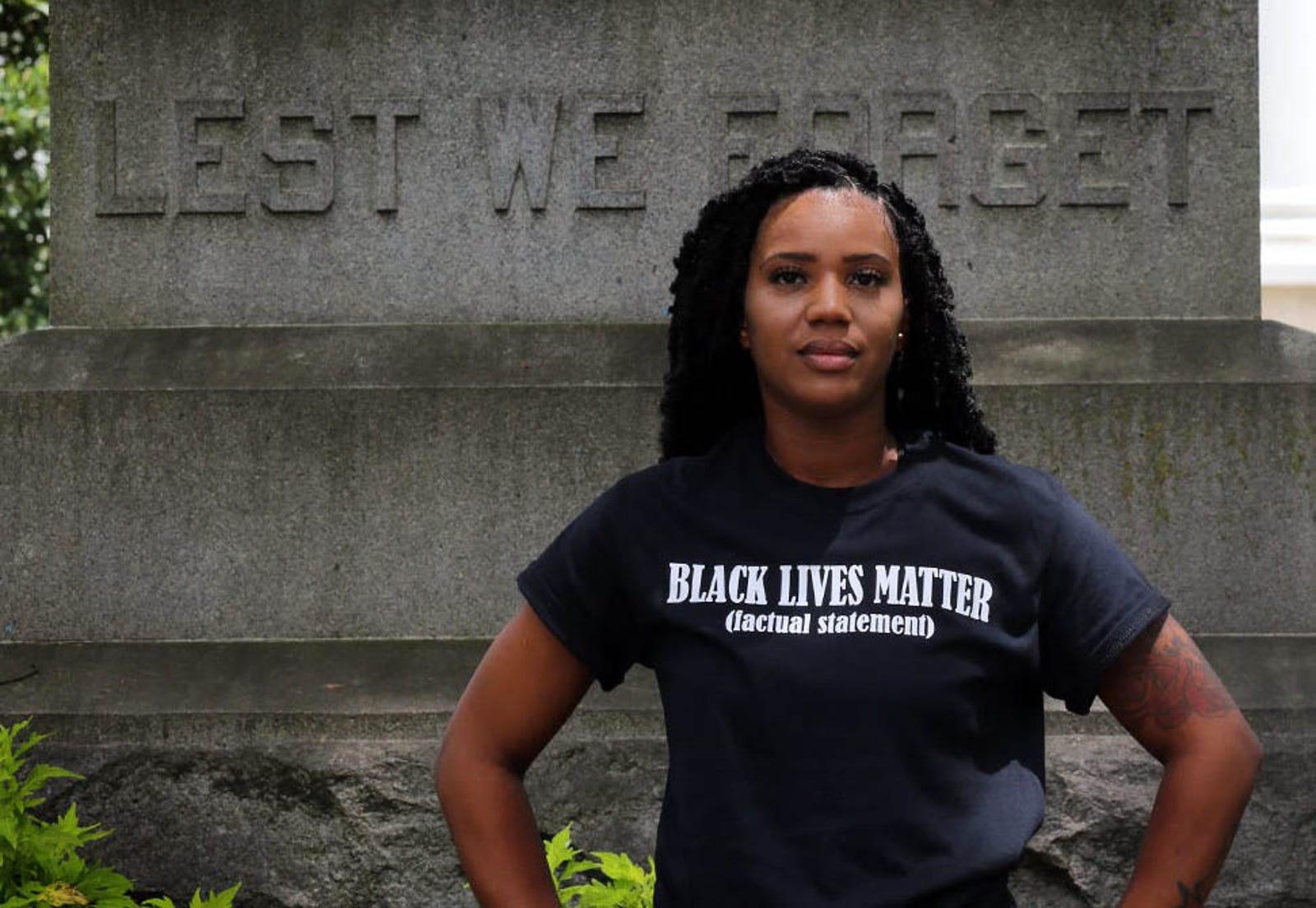By Becca Sitzes

For many people, the video of George Floyd being killed was too painful to watch.
But Alexsis Vinson couldn’t stop looking.
She would watch Floyd’s face for the duration as an officer kneeled on his neck.
Then she would watch the crowd around Floyd who videoed the incident and demanded the officers let him off the ground. One bystander said she knew CPR and offered to help but was turned away.
Finally, Vinson would watch the faces of the officers as she tried to piece it together.
She couldn’t understand why it had happened.
“I don’t know any human with a heart who wouldn’t be bothered by that,” Vinson said. “Something in it makes you ache.”
Vinson wears a Black Lives Matter T-shirt with the words “factual statement” in parentheses underneath. The 27-year-old is athletic and feminine, her hair in braids and her long nails painted. She carries herself with confidence and is quick to laugh, eyes flashing.
One moment she is chanting in the streets and the next, gently praying with a passerby.
Vinson was born in Shelby to a mother who had 11 children, the first arriving when her mother was just 14. She went to live with her grandmother in Winston-Salem for several years, returning to her hometown when she was 12.
Soon after, she attended a church service with her aunt and was nearly overcome by the feeling of God’s presence. She spoke words whose meaning she didn’t know and collapsed to the church floor as she experienced the power of a holy spirit.
“I was never the same since,” Vinson said.
She was left with a sense of purpose and calling that led her to first preach in the streets and now, following Floyd’s death, to lead in the streets.
‘Shelby needed to take action’
“One day I was just at home, after days of being bothered and not being able to eat and talking my friend’s head off; I said, ‘I’m going to protest.’”
People had flooded the streets all over the country, and she decided Shelby needed to take action.
She posted her plans to march uptown on Facebook and invited others to join.
That evening, a group assembled near the Confederate monument on the Shelby court square and spoke out about the deaths of Floyd, Breonna Taylor and the multitude of injustices faced by Black people in America. As they marched they chanted:
No justice, no peace.
They called out the names of the dead and shouted for change and unity.
It’s not always clear how groups choose their leaders. In Shelby, it was with a simple question. At the end of the night, the people looked at Vinson and asked, ‘When’s the next one?’
Vinson hasn’t stopped. She has organized or participated in nearly a dozen protests in Shelby and neighboring Gaston County.
She said her favorite moment was when she saw around 500 people flood the court square and come together to support Black lives. Vinson has used social media as a tool to continue engagement and keep momentum going. She posts about upcoming protests and creates event pages on Facebook. She has gained a following on social media and gained both support and opposition.
Vinson said she is learning to lead and the behavior she exhibits is mirrored back to her. She said she does not support violence, antagonizing others or hurling slurs at police.
“That’s not a way to lead,” Vinson said.
What Alexsis believes needs to happen in Shelby:
- Create more diversity in uptown businesses. Currently the climate is white-centric. Encourage new Black-owned businesses and actively seek ways to invite discussions and opportunities to work towards a more friendly environment for all community members.
- Widen the audience and encourage participation and the appeal in community events, such as Alive After Five, Livermush Festival and other local events which are overwhelmingly white and feature white artists and participants.
- Give Black talent a chance to shine. Involve more Black musicians, vendors and actively reach out to the Black community. Promote community art events, such as painting a street mural or having a spoken word poetry night or featuring music by Black artists.
- Work on more community policing where officers are getting out and meeting people in their own backyards. Develop relationships with the police department and make sure they are out walking in the neighborhoods, talking to people, getting to know them and building trust.
- More diversity in local government and serving on local boards
From a calling to cookouts: ‘It starts with action’
In the early days, some of the first protests attracted hundreds of people. That number has begun to dwindle. Vinson didn’t expect people to be able to keep the same level of energy and momentum as at the beginning and said there are so many ways the work can be carried out.
“As long as you came out and had an experience and it left a mark on your heart, that’s all that matters,” Vinson said.
In the meantime, she plans to keep marching.
She wants Black Lives Matter to be an ongoing conversation instead of a reactionary cry when tragedy strikes. She wants to keep the movement on the forefront.
Vinson is taking action through cookouts and marches. She leads groups on foot into the east and west neighborhoods in the city and is holding cookouts and community events.
“That’s to bring the community together and engage in each other’s cultures, recognize faces. We need that diversity, and we need to celebrate each other. Everybody celebrate each other,” she said.
She believes that with each protest, every time someone reads about it in the media or participates in or shares an event makes a difference.
“I have crazy stupid dumb faith. Things can get better and things will get better, and it starts with us. It starts with an action,” she said. “It’s going to get better.”